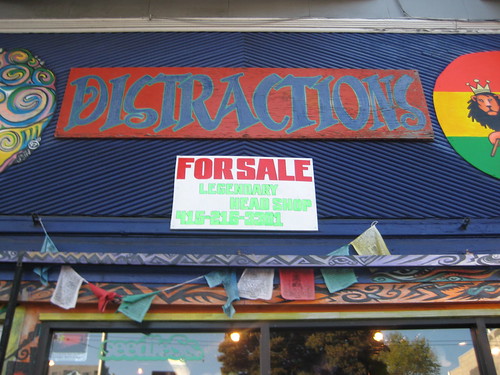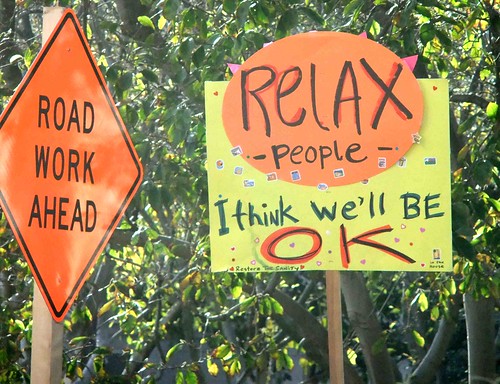
Sphinnn's photostream
I was thinking about some of the reasons I've heard people give for stopping meditating. One of them is "I just can't concentrate on one thing for very long. My thoughts just kind of drift off after a bit. And I get distracted."
So I decided to write this short piece to help you return to meditating. I've included a few very simple tips. That's all. But for some people it been the difference between avoiding meditating and really enjoying being there in meditation. Sure, there are more sophisticated techniques but you won't find them here today. They'll be coming later.
There are two things I'm going to suggest to help remedy the fallout from distraction. The first is to accept that your thoughts will 'drift off' sometimes. Shocking isn't it? You! Getting distracted! Not in control. Not achieving! That must feel like shit! Which at some point very quickly makes you ask the question "why do I want to feel like shit?" So you stop meditating. Or you avoid meditating regularly. Because it's the quickest way to feeling in control again. But what it really means is you've just hidden the shit. You ain't removed it. You've not even accepted that sometimes 'shit happens.'
And there will be times when 'sometimes' may be more frequent than others. There's probably lots of reasons for this but that's beyond the focus of this article. Now, in accepting distracting thoughts and preparing for them, you can easily return your attention to meditating. And that means gentle practice. Your not preparing for a marathon here. But you are preparing to lay solid, flexible foundations for your many meditations.
In a nutshell, what I'm saying is relax. It's OK. It's normal to be distracted sometimes. So when you notice you are distracted, gently return your attention to your breathing, the candle flame or whatever else you are focussing upon. Acceptance it's normal. Be gentle. And return to meditating. I like telling myself that I've got the opportunity to be in a place where the only distractions are in my head. And I can learn to control that.
To be doing this effectively you've got to prepare. There are several ways to build in this skill. I'll pick just the simplest one for now. To begin you simply tell yourself that you will notice when you're distracted and then return to your breathing. Or to say it another way "as soon as I'm aware I've drifted off, l'll return my attention to meditating."
Get used to telling yourself this before you meditate. It's gets your mind focussed upon meditating with a positive intent and presupposes you can do it. Alternatively, you could copy the lady who told me she couldn't tell herself that because she can't concentrate on anything for very long! And that led me into all sorts of things (after I'd finished laughing) which I'll write about another time. But she did learn to relax, concentrate (she'd already done this for years of course, it was just reminding her she can) and she meditated.
Now, you already know the difference between being focussed and being distracted. You know exactly what it feels like. Otherwise you wouldn't use it as an excuse for not meditating. You also know the criticism you give yourself because of it.
Have you ever thought that meditating would be simpler if you recognised the criticism as another useful tool to stop the distraction and return to meditating? What do you think might happen if you wrote down the criticisms and replaced each one with something encouraging you to meditate again and again?
So now you know that, the second step is to practice returning your attention to meditating after you've noticed your distracted. You can do this right now. Simply pick a spot on the wall or a candle flame or your partner's shoes lying in front of you. Tell yourself that as soon as you notice your distracted you'll return to 'meditating' upon the shoes. Sounds kinda simple doesn't it? Not very exciting or ground breaking is it? Well your probably right on both counts. But do it anyway. Making the right judgements about things you've not explored yet may lead to all sorts of really useful things.
I'll expand on this in due course. For now I'll wish you all the best with your practise.
I was thinking about some of the reasons I've heard people give for stopping meditating. One of them is "I just can't concentrate on one thing for very long. My thoughts just kind of drift off after a bit. And I get distracted."
So I decided to write this short piece to help you return to meditating. I've included a few very simple tips. That's all. But for some people it been the difference between avoiding meditating and really enjoying being there in meditation. Sure, there are more sophisticated techniques but you won't find them here today. They'll be coming later.
There are two things I'm going to suggest to help remedy the fallout from distraction. The first is to accept that your thoughts will 'drift off' sometimes. Shocking isn't it? You! Getting distracted! Not in control. Not achieving! That must feel like shit! Which at some point very quickly makes you ask the question "why do I want to feel like shit?" So you stop meditating. Or you avoid meditating regularly. Because it's the quickest way to feeling in control again. But what it really means is you've just hidden the shit. You ain't removed it. You've not even accepted that sometimes 'shit happens.'
And there will be times when 'sometimes' may be more frequent than others. There's probably lots of reasons for this but that's beyond the focus of this article. Now, in accepting distracting thoughts and preparing for them, you can easily return your attention to meditating. And that means gentle practice. Your not preparing for a marathon here. But you are preparing to lay solid, flexible foundations for your many meditations.
In a nutshell, what I'm saying is relax. It's OK. It's normal to be distracted sometimes. So when you notice you are distracted, gently return your attention to your breathing, the candle flame or whatever else you are focussing upon. Acceptance it's normal. Be gentle. And return to meditating. I like telling myself that I've got the opportunity to be in a place where the only distractions are in my head. And I can learn to control that.
To be doing this effectively you've got to prepare. There are several ways to build in this skill. I'll pick just the simplest one for now. To begin you simply tell yourself that you will notice when you're distracted and then return to your breathing. Or to say it another way "as soon as I'm aware I've drifted off, l'll return my attention to meditating."
Get used to telling yourself this before you meditate. It's gets your mind focussed upon meditating with a positive intent and presupposes you can do it. Alternatively, you could copy the lady who told me she couldn't tell herself that because she can't concentrate on anything for very long! And that led me into all sorts of things (after I'd finished laughing) which I'll write about another time. But she did learn to relax, concentrate (she'd already done this for years of course, it was just reminding her she can) and she meditated.
Now, you already know the difference between being focussed and being distracted. You know exactly what it feels like. Otherwise you wouldn't use it as an excuse for not meditating. You also know the criticism you give yourself because of it.
Have you ever thought that meditating would be simpler if you recognised the criticism as another useful tool to stop the distraction and return to meditating? What do you think might happen if you wrote down the criticisms and replaced each one with something encouraging you to meditate again and again?
So now you know that, the second step is to practice returning your attention to meditating after you've noticed your distracted. You can do this right now. Simply pick a spot on the wall or a candle flame or your partner's shoes lying in front of you. Tell yourself that as soon as you notice your distracted you'll return to 'meditating' upon the shoes. Sounds kinda simple doesn't it? Not very exciting or ground breaking is it? Well your probably right on both counts. But do it anyway. Making the right judgements about things you've not explored yet may lead to all sorts of really useful things.
I'll expand on this in due course. For now I'll wish you all the best with your practise.

